The Kenyan Catholic Archbishop said that for refusing to be inherited, widows in Nyanza “are ostracized by their communities.”
“Some are rejected. Some lose all their inheritance because of that. They have no access to the property left behind by the husband,” he explained.
Reports have named widowhood as the source of endless distress among the Luo of Kenya’s Nyanza region. Their tribulations include endless court battles for property, rejection, and being blamed for any misfortune that befalls their families.
Such was the case for Margaret Omwa, who joined St. Monica Widows Group in 1996 following the death of her husband.
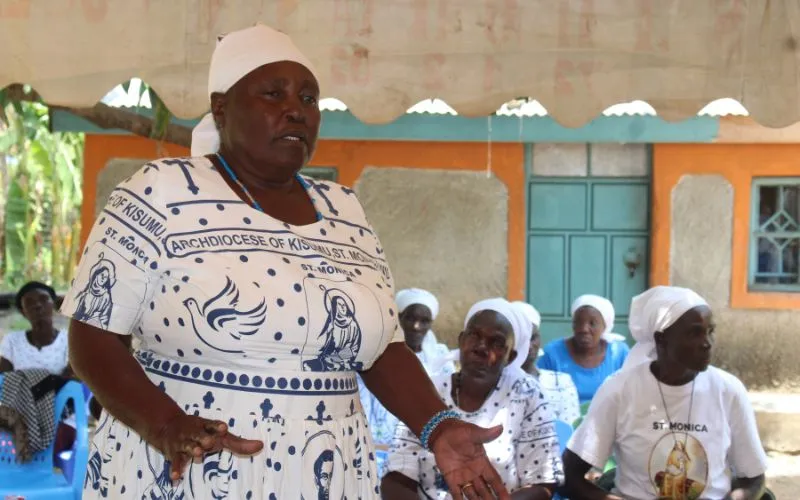 Margaret Omwa. Credit: ACI Africa
Margaret Omwa. Credit: ACI Africa
(Story continues below)
“I passed through a lot,” Margaret tells ACI Africa, adding, “My husband died in an accident when we were just building our house. On his death, his relatives roofed a small section of the house and left the rest bare. It was a trap to oblige me to get a man who would complete the entire roofing. None of the people I contacted accepted to complete the roofing.”
“My husband’s relatives then started inciting my children against me, starting with my first son. He totally refused to step inside my house. He wouldn’t eat my food and he refused to talk to me. He saw me as an enemy because I had refused to be inherited,” she added.
Her estranged son who was living with HIV was also made to believe that it was her mother’s “uncleanliness” that had made him unwell.
“I was blamed for any misfortune that befell the family. Eventually, my late husband’s relatives convinced my son to go and rent himself a house away from me. I am grateful that on his deathbed, he had accepted that he had HIV. We were also on talking terms,” Margaret shares.
But Margaret’s relationship with her in-laws never improved, she says, and explains, “They did very bad things to me in an attempt to get me remarried. They held clan meetings with me to decide my punishment. But I kept reminding them that I had made a vow on my husband’s burial day that I only had a place for him in my life. That I didn’t have any space left for another man.”
“When all their attempts failed, they left alongside my son, swearing never to help me again,” she recalled during the October 2 interview.
Fr. Lawrence tells ACI Africa that while other people believe in the vow “until death does us part”, the widows of St. Monica say “until death unites us” on the burial of their husbands, and refuse to be remarried.
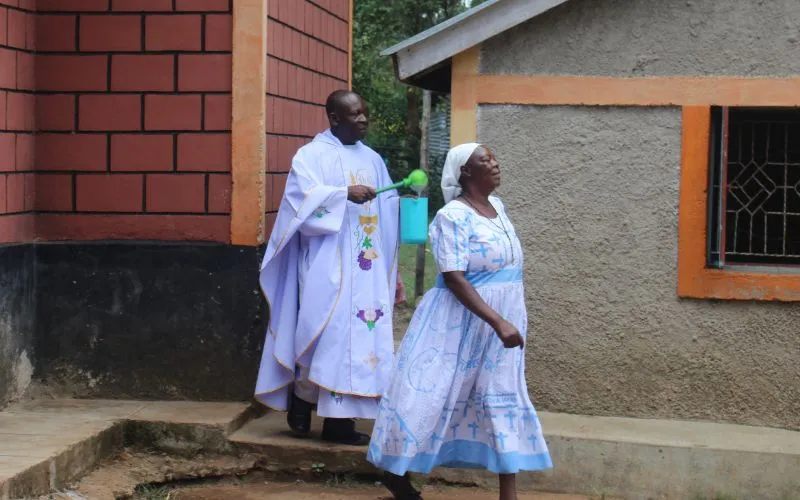 Credit: ACI Africa
Credit: ACI Africa
Members of the group are therefore women who, Fr. Lawrence says, “have refused to allow anything to come between them and the grave of their husbands.”
“St. Monica’s Group of Widows are people who want to be true to the Sacrament of Baptism and Matrimony; those who allow nothing to come into their way of partaking in the Holy Communion. Not even tradition,” he says.
“We also have auxiliary members who support the group’s activities, and continue being members of the group the moment their spouses pass on,” he says.
In the Catholic Archdiocese of Kisumu, St. Monica’s Group of Widows is one of the lay apostolate groups organized all the way from the Small Christian Communities (SCCs) to sub-parishes, to the Parish Councils, Deaneries, and to the Diocese.
The group is also engaging other Catholic Dioceses to get to the national level, Fr. Lawrence says, and adds, “Organization starts at the SCCs because it is at the grassroots that the challenges of these widows are best understood.”
The activities of the group include prayer and support of the Priests with the little that the widows have, Fr. Lawrence says, and explains, “Every November, the widows tend to the graves of deceased Priests. They clean the graves, organize for Holy Mass for them, and hold prayers at the graveyards of departed Priests in the Archdiocese.”
They also build houses for those among them who have been thrown out by the relatives of their deceased husbands.
The widows also support orphans who, according to the group’s chairperson, Roselyne Auma, are always left under the care of their elderly grandmothers.
In an attempt to explain the high HIV prevalence in Nyanza, Roselyne, who joined the group in 2002 following her husband’s death says that widows remarry, unaware that their late husbands infected them with the virus.
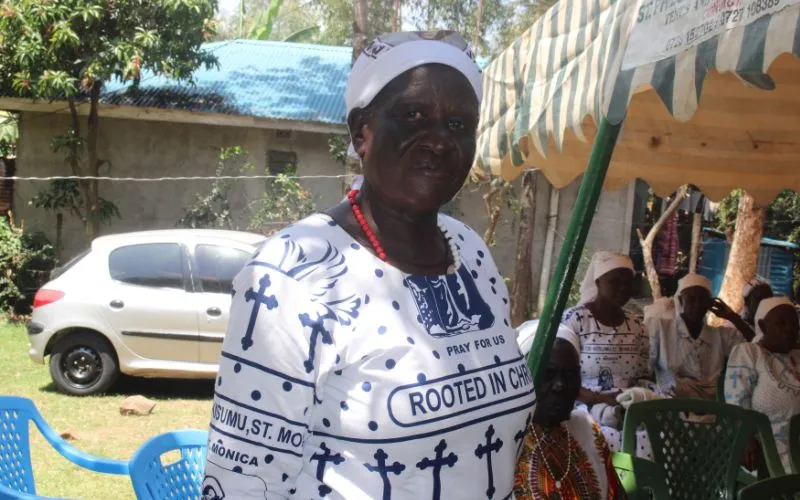 Roselyne Auma, chairperson of St. Monica Widows Group. Credit: ACI Africa
Roselyne Auma, chairperson of St. Monica Widows Group. Credit: ACI Africa
Others do not believe that HIV exists, and blame the virus-related illnesses on witchcraft, Roselyne says, and adds, “The man who performs ritual sex sleeps with very many women since his job is to cleanse the widows. This is one of the leading reasons for the spread of the virus.”
Apart from the care of orphans, members of St. Monica’s Group of Widows bury their own who the rest of the society considers unclean even in death. The women do everything starting with the digging of the grave.
Describing the stigma against those who refuse to get remarried, Susan says, “The moment you decide to follow Christ and reject traditions, you face instant rejection. One is stigmatized and separated from their children. They are considered unclean and unworthy to mingle with anyone including their children.”
She says that even with Christianity, there are people who go to Church and still engage in traditional rituals.
Susan says that being together with other widows of St. Monica reduces the loneliness and the pain that one experiences.
“With all the rejection, it is so easy for one to get depressed. But when we come together and visit each other, everything becomes easier,” the mother of two says.
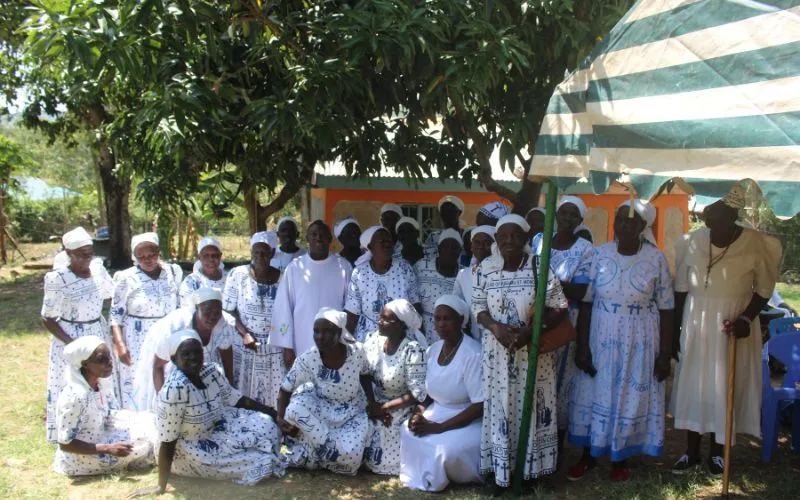 Members of St. Monica Widows Group pose for a photo after Holy Mass at St, Aloysius Gonzanga Catholic Parish of the Archdiocese of Kisumu in Kenya. Credit: ACI Africa
Members of St. Monica Widows Group pose for a photo after Holy Mass at St, Aloysius Gonzanga Catholic Parish of the Archdiocese of Kisumu in Kenya. Credit: ACI Africa
“Priests are the only people we run to with our challenges. Sometimes, we overwhelm them with our issues,” she says.
Responding to the inspiration behind the name St. Monica, Fr. Lawrence tells ACI Africa, “The widows here find it easy to relate with St. Monica, who was not only a widow but also African. They put themselves in the position of St. Monica, the mother of St. Augustine.”
He continues, “When Augustine became stubborn, his mother became close to Priests, asking them to pray for her son. Eventually, Augustine became a Priest and a Bishop. This is what our widows do in an effort to protect their children from the influence of harmful traditions.”
Agnes Aineah is a Kenyan journalist with a background in digital and newspaper reporting. She holds a Master of Arts in Digital Journalism from the Aga Khan University, Graduate School of Media and Communications and a Bachelor's Degree in Linguistics, Media and Communications from Kenya's Moi University. Agnes currently serves as a journalist for ACI Africa.
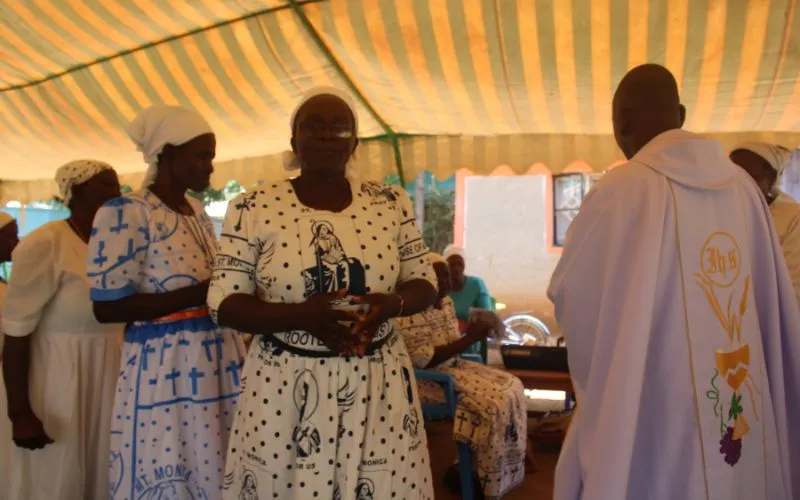 "The moment your husband dies, you are to sit in an isolated place in a specific chair. A widow is not allowed to mingle with other people because she is considered unclean, and is to shave her head clean. An old widow comes to cook your meals, and henceforth, you are not allowed to mingle with women who have husbands. Your company becomes fellow widows. These rituals add to the pain of the woman who is already in mourning. Wife inheritance is the ultimate cleansing ritual," Susan Auma. Credit: ACI Africa
"The moment your husband dies, you are to sit in an isolated place in a specific chair. A widow is not allowed to mingle with other people because she is considered unclean, and is to shave her head clean. An old widow comes to cook your meals, and henceforth, you are not allowed to mingle with women who have husbands. Your company becomes fellow widows. These rituals add to the pain of the woman who is already in mourning. Wife inheritance is the ultimate cleansing ritual," Susan Auma. Credit: ACI Africa


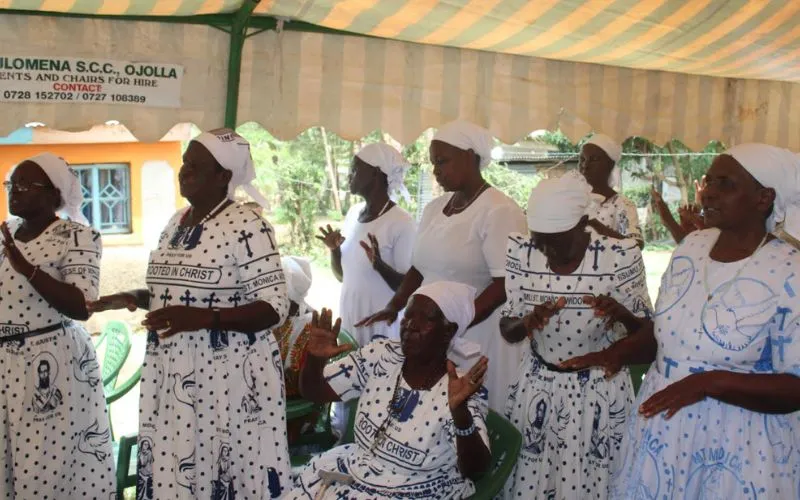
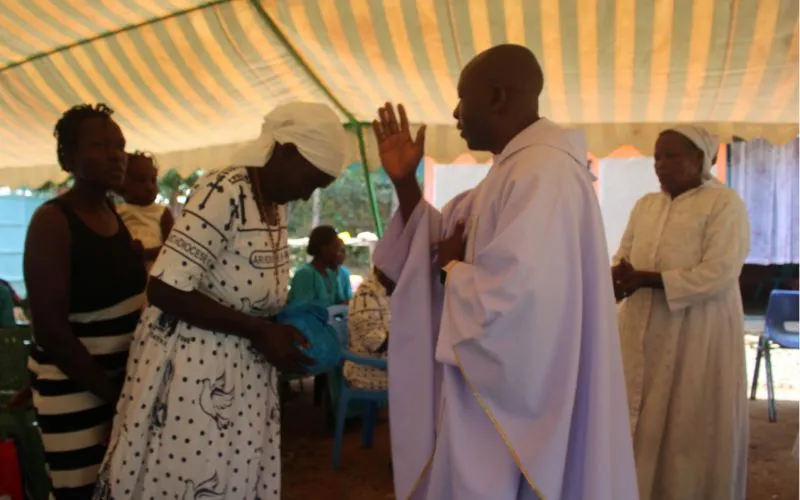 “St. Monica’s Group of Widows are people who want to be true to the Sacrament of Baptism and Matrimony, those who allow nothing to come into their way of partaking in the Holy Communion. Not even tradition,” Fr. Lawrence Omollo, Chaplain of St. Monica Widows Group. Credit: ACI Africa
“St. Monica’s Group of Widows are people who want to be true to the Sacrament of Baptism and Matrimony, those who allow nothing to come into their way of partaking in the Holy Communion. Not even tradition,” Fr. Lawrence Omollo, Chaplain of St. Monica Widows Group. Credit: ACI Africa
 Margaret Omwa. Credit: ACI Africa
Margaret Omwa. Credit: ACI Africa Credit: ACI Africa
Credit: ACI Africa Roselyne Auma, chairperson of St. Monica Widows Group. Credit: ACI Africa
Roselyne Auma, chairperson of St. Monica Widows Group. Credit: ACI Africa Members of St. Monica Widows Group pose for a photo after Holy Mass at St, Aloysius Gonzanga Catholic Parish of the Archdiocese of Kisumu in Kenya. Credit: ACI Africa
Members of St. Monica Widows Group pose for a photo after Holy Mass at St, Aloysius Gonzanga Catholic Parish of the Archdiocese of Kisumu in Kenya. Credit: ACI Africa


